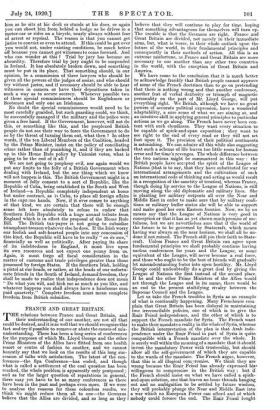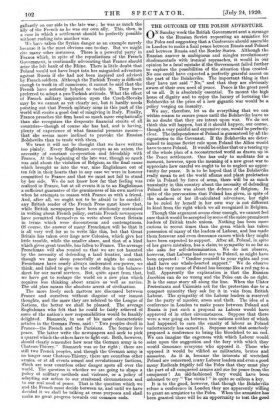FRANCE AND GREAT BRITAIN. T HE relations between France and Great
Britain, and their understanding of one another, are not all that could be desired, and it is as well that we should recognize this fact and try if possible to remove or abate the causes of mis- understanding. There has been a long series of conferences for the purposes of which Mr. Lloyd George and the other Prime Ministers of the Allies have flitted from one health resort or centre of fashion to another, and we cannot honestly say that we look on the results of this long suc- cession of talks with satisfaction. The latest of the con- ferences—the Spa Conference—has ended, and though what is called a settlement of the coal question has been reached, the whole problem is apparently only postponed ; and as for the larger question of reparations in general, there may yet have to be as many conferences as there have been in the past and perhaps even more. If we were to analyse the reasons for these• colourless results, we think we might reduce them all to one—the Germans believe that the Allies are divided, and so long as they believe that they will continue to play for time, hoping that something advantageous for themselves will turn up. The trouble is that the Germans are right. France and Great Britain are divided, not merely in their immediate aims, but, what is worse, in their whole outlook upon the future of the world, in their fundamental principles and consequently in their methods of action. All this is an extreme misfortune, as France and Great Britain are more necessary to one another than any other two countries in the world, with the exception of Great Britain and America.
We have come to the conclusion that it is much better to acknowledge frankly that British people cannot approve of some of the French doctrines than to go on pretending that there is nothing wrong and that another conference, another feat of verbal dexterity or triumph of magnetic personality on the part of Mr. Lloyd George, will put everything right. We British, although we have no great powers of accurate political expression, have a wonderful adaptability, a sure sense of what we are aiming at, and an intuitive skill in applying general principles to particular actions as we go along. The French have never been con- tent with such cloudiness. They want every situation to be capable of spick-and-span exposition ; they want to see right to the end of every road or they will not set foot upon it. The precision of their political sentiments is astonishing. We can admire all this while also suggesting that such a scheme of life leaves too little room for human error and for time's revenges. The whole difference between the two nations might be summarized in this way : the British people have accapted the spirit of the League of Nations (that is to say, that they have substituted for war international arrangements and the cultivation of such an international code of thinking and acting as would result in a recognition of the sanctity of treaties), whereas France, though doing lip service to the League of Nations, is still moving along the old diplomatic and military lines. She is planting her military outposts all over the Near and Middle East in order to make sure that by military coali- tions or military buffer states she will be able to support and make good her own Eastern frontier. Now, we by no means say that the League of Nations is very good in conception or that it has as yet shown much promise of use- fulness, but we are nevertheless sure that if the world of the future is to be governed by Statecraft, which means having war always on the near horizon, we shall all be un- done if not ruined. The French still pin their faith to State- craft. Unless France and Great Britain can agree upon fundamental principles we shall probably continue having useless conferences for years and the League, or some equivalent of the League, will never become a real force, and those who ought to be the best of friends will gradually let misunderstanding understanding fester into open hostility. Mr. Lloyd George could undoubtedly do a great deal by giving the League of Nations the first instead of the second place. If he and the other Prime Ministers of the Allies would act through the League and in its name, there would be an end to the present stultifying rivalry between the Supreme Council and the League.
Let us take the French troubles in Syria as an example of what is continually happening. Many Frenchmen com- plain that Great Britain has been disloyal in maintaining two irreconcilable policies, one of which is to give the Emir Feisul independence, and. the other of which is to support the French mandate for Syria. The French want to make their mandate a reality in the whole of Syria, whereas the British interpretation of the plan is that Arab inde- pendence under the Emir Feisul in part of Syria is quite compatible with a French mandate over the whole. It is surely well within the meaning of a mandate that it should invest the mandatory Power with trusteeship, but should allow all the sell-government of which they are capable to the wards of the mandate. The French argue, however, that this is all illogical com?romise. We think they are wrong because the Emir Feisul has already expressed his. willingness to compromise in the British way ; but if the French should insist on what we have called a spick- and-span solution, one that leaves no loose threads hanging out and no ambiguities to be settled by future wisdom, they will probably plunge the Near and Middle East into a war which no European Power can afford and of which nobody could foresee the end. The Emir Feisul fought gallantly on our side in the late war ; he was as much the ally of the French as he was our own ally. This, then, is a case in which a settlement should be perfectly possible without rushing into another war. We have taken the Syrian danger as an example merely because it is the most obvious one to-day. But we might cite many other instances. There is a powerful party in France which, in spite of the repudiations of the French Government, is continually advocating that France should seize the left bank of the Rhine. There is little doubt that Poland would not have leapt into her misguided adventure against Russia if she had not been inspired and advised by French soldiers. Although the Turkish Treaty is difficult enough to work in all conscience, it cannot be said that the French have seriously helped to tackle it. They have preferred to adopt a pro-Turkish attitude. What the effect of French military inspiration upon the Czech-Slovaks may be we cannot as yet clearly see, but it hardly needs pointing out that French military aims in this part of the world will excite a good deal of misgiving in Italy. Finally, France preaches the firm hand so much more emphatically than she recognizes the desperate financial straits of all countries—though of course she has had, and is having, plenty of experience of what financial pressure means— that she seems more inclined to provoke the Russian Bolsheviks than to trade with them.
We trust it will not be thought that we have written too plainly. Every Englishman accepts as an axiom the necessity of constant co-operation and friendship with France. At the beginning of the late war, though so much was said about the violation of Belgium as the final cause which brought us into the war, nine Englishmen out of ten felt in their hearts that in any case we were in honour committed to France and that we must not fail to stand by her side. We do not know how far that feeling was realized in France, but at all events it is to an Englishman a sufficient guarantee of the genuineness of his own motives when he attempts to reason with France as with a friend. And, after all, we ought not to be afraid to be candid ; any British reader of the French Press must know that, while British newspapers have been studiously restrained in writing about French policy, certain French newspapers have permitted themselves to write about Great Britain in terms which were discourteous and contemptuous. Of course, the answer of many Frenchmen will be that it is all very well for us to write like this, but that Great Britain has taken over huge new Colonies, which give her little trouble, while the smaller share, and that of a kind which gives great trouble, has fallen to France. The average Frenchman will also remind us that we are not haunted by the necessity of defending a land frontier, and that though we may sleep peacefully at nights he cannot. Frenchmen have nearly always underrated sea-power, we think, and failed to give us the credit due in the balance- sheet for our naval services. But, quite apart from that, we have got to reshape the world on a new plan which requires less thinking about armies as well as navies. The old plan means the absolute arrest of civilization.
The more freely such matters are discussed between France and ourselves without disguise of our inmost thoughts, and the more they are referred to the League of Nations, the better we shall be pleased. The average Englishman who felt that he could be fairly relieved of some of the nation's new responsibilities would be frankly delighted. Bismarck-, in one of his most characteristic articles in the German Press, said : "Two peoples dwell in France—the French and the Parisians. The former love peace. The latter write the newspapers and seek to pick a quarrel which the others have to fight out. Both, however, should clearly remember how near the German army is to Chateau-Thierry." Bismarck was so far right ; there are still two French peoples, and though the German army is no longer near Chateau-Thierry, there are countless other armies, or at all events armed and revolutionary factions, which are near countless other danger spots all over the world. The question is whether we are going to shape a policy. of military methods and violence, or a policy of adapting our action to our straitened circumstances and to our real need of peace. That is the question which we and the French must decide between us, and until we have decided it we shall be talking at cross purposes and shall make no great progress towards our common ends.



































 Previous page
Previous page